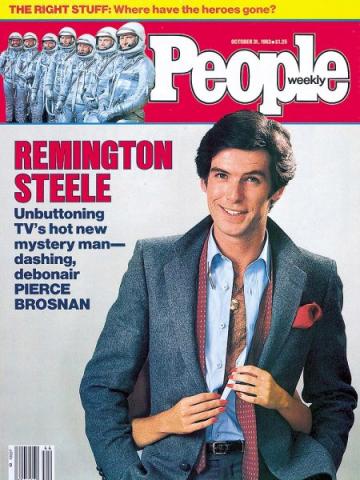People Magazine - Remington Steele cover article (10/31/83)

He’s not like all the other handsome men of TV, the Tom Sellecks, the Lee Majors, the Mr. Ts. His facial features are sculpted out of soapstone instead of granite, his blue eyes really do twinkle and his 6’1″ physique does not boast goalposts for shoulders; he was designed for designer clothes. He is handsome but quiet about it. “I don’t see myself as a hunk of the month,” he demurs. “I don’t think anyone is going to ask me to take off my shirt. My chest is rather pale.” Odd statement for a sex symbol. He says it in an odd accent—a little English, a little Irish, a lot of class. He has an odd name too; if you say it the right way, it sounds like a line from a chicken recipe: “Pierce Brosnan, cover dish and bake at 350 degrees.”
Pierce Brosnan is, some say, the new Cary Grant—sexy but suave, funny with subtlety instead of slapstick, manly but mannered. The thinking woman’s hunk.
On TV he is Remington Steele. At least he says he is. His employer on the show, Laura Holt (played by Stephanie Zimbalist), made up the name—a touch of masculine class to put on the door of her one-woman detective agency. Then he walked in that door, took on the name and charmed his way into her heart. Together—with their romance finally making it to first base this season—they are a modern Nick and Nora Charles, forever flirting and fighting. She is the real detective. He bumbles his way through cases, comparing them to old movie plots from Key Largo to The Maltese Falcon. Always, Remington remains a mystery. No one even knows his real name.
As Remington Steele or as Pierce Brosnan, he is not what he seems. That’s bad news for those who have their hearts set on him. For though Brosnan seems the dashing bachelor, he is not. Pierce, 31, is a married man—and don’t think for a second, ladies, that you’ll be able to steal him from his wife, Australian-born actress Cassandra Harris, 31. Cassie was a Bond woman in For Your Eyes Only, a subject in Lord Patrick Lichfield’s book, The World’s Most Beautiful Women, and even a guest star on Remington last season, playing Pierce’s former girlfriend. It’s rough for her, being married to a sex symbol. Pierce says that his adoring fans—who send him up to 500 love letters a week—get “a little insensitive to her. They say things like, ‘God, you’re married to this hunk! How can you be so lucky?’ What they don’t realize is that I am the lucky one.” No way you’ll break that one up.
He is a family man too—the father of three, including a baby, Sean William, born in September. “A strapping boy,” Pierce boasts, “very, very bonny.”
And he is a shy man, says his wife, “the opposite of Remington Steele, very careful and conservative, very precise, not quick to take risks.”
But like Remington, Pierce just seemed to appear one day, popping out from nowhere. Americans saw him, briefly, in a bit part in the 1980 movie The Mirror Crack’d. In his one scene he played an actor “being clasped against Elizabeth Taylor’s bosom, looking absolutely ridiculous. My hair is all frizzed up. I’ve got rouge on my cheeks and a beauty mark. I’m wearing this fancy silk shirt, and I was much heavier then. I looked like I didn’t have a thought in my head.”
He later tried out for the role of Rory O’Manion in the 1981 miniseries The Manions of America. Its producers saw Mirror, Pierce says, “and it nearly lost me the damned part.” Luckily though, they saw something deeper than the beauty mark. He was hired.
When Manions aired, Pierce and Cassandra made their first trip to L.A. With borrowed money, they got plane tickets from London and a Rent-a-Wreck in L.A. so Pierce could go job hunting. He arrived at his first interview for Remington in “this beat-up old Pacer, looking very dapper in my suit and tie. Maybe that clinched it for me,” he says. “They probably thought, ‘Anyone who dresses like that and drives a car that looks like that must have style.’ ”
Michael Gleason, the show’s co-creator, says he never thought that the character of Remington should be British. But two TV bigwigs did. Then Brosnan came in for his interview. He was British. He was perfect for the part. Zimbalist, 27, calls her leading man “a doll, just great to work with. A prince, really.”
This season, things are changing on the show. To concentrate more on Remington and Laura’s chemistry, the producers dropped two characters, replacing them with Doris Roberts, an Emmy-winner for a part in St. Elsewhere. (Her husband, William, died in August, and Pierce named his son, Sean William, in his honor.)
Remington is also coming out of his shell this season. Pierce has never objected to playing second fiddle to a woman—”I don’t have any kind of sexist problem,” he says, “I think that’s all hogwash, really.” Still, he’s happy to report that “Steele won’t be so bumbling. He’ll still miss a beat every now and then. But the man has had enough of tagging along.” He adds: “More of my past will be revealed, much more.” Maybe he’ll finally tell his real name.
Just as TV is bringing out Steele’s past, so has it helped bring out Brosnan’s. Because of TV, Brosnan got to talk to the father he never knew, a carpenter who left his family when Pierce, an only child, was barely a year old.
Brosnan was filming Manions in Ireland in 1980 when, he recalls, “a cousin called me and said: ‘I believe my uncle, Tom Brosnan, is your father.’ He said my father didn’t know he was calling, but that he was sure he’d love to see me. But I couldn’t do it just then. We’d been too long a time apart.” A year went by, says Pierce, and “curiosity got the best of me. I was thinking of my children as well; he is their grandfather. So I decided to make contact and we spoke once over the phone.” It was, understandably, a difficult call. His father, who never remarried, broke down and, Pierce admits, “I began to crack too.” He wanted to get together with his father, but work got in the way. “I plan to write him a letter about the new child,” Pierce says. “I was truly sorry I wasn’t able to get over there for our reunion.”
Pierce holds no bitterness toward his father. His parents’ marriage was troubled and “just didn’t work out, so they parted,” he says. “Catholicism has a very tight hold on people in southern Ireland, and I think it was very difficult for both of them, really.”
His father’s departure did, however, make life tough for young Pierce. His mother went to London to study nursing, leaving her child to live with his grandparents. When they died, Pierce was taken in by an aunt and uncle, then a family friend. “I remember missing my mother very much,” he says. She would visit occasionally, but “those were heartbreaking times because she’d have to return to London.” He speaks in his usual measured tones about his unhappy childhood. Even Cassandra is amazed that she hears no anger from him. “It’s obviously there, but it’s covered by layers, veils of things,” he says. “I played a lot by myself. I guess you could say I was introverted.”
When Pierce was 11, his mother—who had since married a kindly Scottish mechanic—sent for her son. He remembers his uncle putting him on a plane, asking a priest to look out for the boy. “I had a bottle of holy water in one hand in an aspirin bottle and rosary beads in the other. I was wearing these little short trousers and a bow tie and had a crew cut. It’s so hysterical to think about. When we arrived in England, the priest said, ‘God bless you, son’ and walked away. I didn’t know where to go. But my mother came soon, fortunately, and it was a joyous occasion.”
Pierce, an altar boy raised in a strict Catholic school where the slightest infraction would get you “strapped with a paddybat,” could not believe the size and freedom of London’s schools. “I kept waiting to get hit,” he says, “and when I found out I wouldn’t be, I had a whale of a time.” He got A’s in English and art and went off to become a commercial artist for department stores.
Then he discovered acting at a theater club. “It was like more veils being lifted off all those years of inhibitions,” he says. He studied at the Drama Centre in London and later made it to the city’s West End theaters, playing in the 1977 London premiere of Tennessee Williams’ The Red Devil Battery Sign. He still treasures a framed telegram from Williams that reads: “Thank God for you, my dear boy.” Though the show quickly closed, Brosnan’s reviews were good. “From then on,” he says, “I was never out of work.”
Years before, in 1970, Pierce had met Cassie. “She was absolutely raving beautiful, long blond hair, tanned,” he says, still with a sigh. He sees himself then, as usual, in the cracked mirror of self-deprecating humor. His hair was short and greased back for a part he was playing. “I looked ridiculous,” he says. “But I was totally bowled over by this beauty. I never realized that she’d be my wife—but that was it, for me, when I first saw her. It wasn’t for her, though. It took some wooing. Actually, I think she felt sympathy for me.”
Cassie, the more outgoing of the two, doesn’t dispute his recollection. “I certainly had no interest in him at all,” she says. “Here was this funny-looking man with this short haircut and definitely overweight—although he’s very slim now. I didn’t dream this wonderful person existed underneath.”
They started living together soon after they met. “That was an era when marriage didn’t seem that important if one had a good relationship,” Cassie says. “We saw nothing wrong with our arrangement. We were in love. We loved our children.” But Pierce says that they decided to tie the knot because “finally my Catholic morality caught up with me.” They married in 1977. By that time, they already had two children, Charlotte and Christopher. But Sean William’s was the first birth Pierce got to witness. “The whole thing was so serene, so gentle,” he says. “We both wept.”
The Brosnans miss England and their home in Wimbledon, a Victorian with a picket fence. It was all bare floors when they moved in, but they have slowly and lovingly furnished it. And it’s a great place for the kids. “They have a lovely park and lots of children to play with,” Pierce says. “Here, they have only the pool.” Here is a rented, five-bedroom home in the Hollywood Hills. In a show of permanence, the Brosnans just imported their family dog, Albert, from England. This could be their home for quite some time.
Cassie is working on a project dear to her heart, a film or miniseries based on the diaries of her grandmother, a novelist and artist who married a German baron and was smuggled out to Australia in World War I. Meanwhile, Pierce has his sudden adulation to keep him busy. It’s about time for him to be thinking about making a poster, like the other hunks have. “The idea has crossed my mind,” he says with a grin, “but if I do, it will be in a tuxedo, not a pair of swim trunks.” Class. The man does have class.
By Jeff Jarvis
Source





